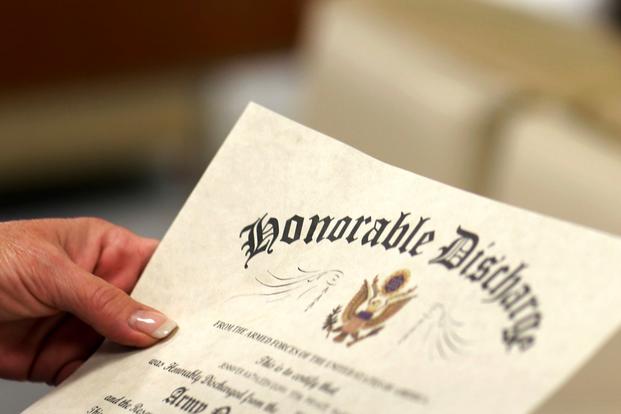The opinions expressed in this op-ed are those of the author and do not necessarily reflect the views of Military.com. If you would like to submit your own commentary, please send your article to opinions@military.com for consideration.
Eric Duncan is an associate in Tully Rinckey PLLC's Buffalo office, where he focuses his practice around military law. Prior to joining Tully Rinckey, Duncan served in the United States Marine Corps' infantry.
You have spent countless years of your life serving your country with honor and distinction, only to find yourself facing a discharge classified as less than fully honorable due to misconduct.
Your retirement could be lost, the education benefits you earned are now gone, and your entitlement to other Department of Veterans Affairs benefits has been stripped away as well.
The various discharge review boards provide a mechanism to restore your access to those veterans benefits through a discharge upgrade. While the name of the board seems self-explanatory and the process appears straightforward, it can be very complicated for some.
The discharge review boards exist for all branches of the military and have the power to correct inequities or improprieties in military service records. This can mean upgrading a discharge from other-than-honorable to general under honorable conditions and can result in the restoration of some veterans' benefits administered by the VA. An upgrade from general to honorable would restore a service member's access to Post-9/11 GI Bill education benefits, one of the most popular and valuable benefits offered to veterans.
Besides upgrading a military discharge classification, the boards have the power to change a service member's reentry code, correct the narrative reason for separation, and even change the separation authority. This could result in a service member becoming eligible to reenlist in the military or avoiding having to explain why their DD-214 lists things like "drug abuse" or "serious misconduct" under the narrative for separation.
A service member has the right to submit a request to the discharge review board if they apply within 15 years of their separation from service. They are required to complete a DD Form 293, and I highly recommend that a comprehensive petition be submitted along with the completed form in order to increase the chances of the board granting relief.
The petition should be drafted in an organized and well-labeled manner to allow the board to find the information it wants quickly. The person who writes the petition must know what information the board will want and how to persuasively present that information in the light most favorable to the applicant. Often, service members attempt to write their own petitions and are denied because they fail to provide supporting documents or adequately explain why the board should act.
In 2014, then-Defense Secretary Chuck Hagel issued policy guidance to the various review boards instructing them to consider post-traumatic stress disorder as a potential mitigating factor in instances of military misconduct. The memorandum instructs the boards to give "liberal consideration" to any petition in which PTSD could be considered to have been an underlying cause or factor in the misconduct. The memorandum and its policies have provided relief for countless service members who were discharged at a time when PTSD and its effects were largely misunderstood by society.
In 2017, A.M. Kurta, who was performing the duties of the under secretary of defense, issued guidance to the boards that expanded upon Secretary Hagel's, instructing them to consider any underlying mental health condition as a mitigating factor in military misconduct. The Kurta memo acknowledged that mental health conditions are often undiagnosed or diagnosed years after the veteran has left service, and it directed the boards to give liberal consideration when doing so is supported by evidence indicating the condition existed during a veteran's military service. This includes instances where a traumatic brain injury, one of the most common injuries from the wars in Iraq and Afghanistan, is present, as well as instances of sexual assault or harassment.
The following year, Under Secretary of Defense Robert Wilkie issued guidance to the boards directing them to consider numerous factors when a petition for relief is sought on the basis of equity, injustice or clemency grounds. The Wilkie memorandum says that an honorable discharge characterization does not require flawless military service and requires the boards to consider whether the discharge characterization received by the service member is disproportionate to the alleged offense and whether the service member received disparate treatment compared to other troops who have committed the same or similar offenses. Similarly, the boards have received guidance directing them to correct a service member's military records when the veteran was discharged under the archaic policy of "Don't Ask, Don't Tell."
A discharge characterization of anything less than fully honorable does not have to deprive you of access to veterans' benefits indefinitely, and the stigma that may be associated with a certain type of discharge doesn't have to, either. The review boards have the power to upgrade a discharge characterization and routinely do for service members who submit a compelling petition and the proper supporting documents. In some cases, this can result in the restoration of entitlement to all veteran benefits, including access to health care for service-connected disabilities and hundreds of thousands of dollars in disability compensation.











